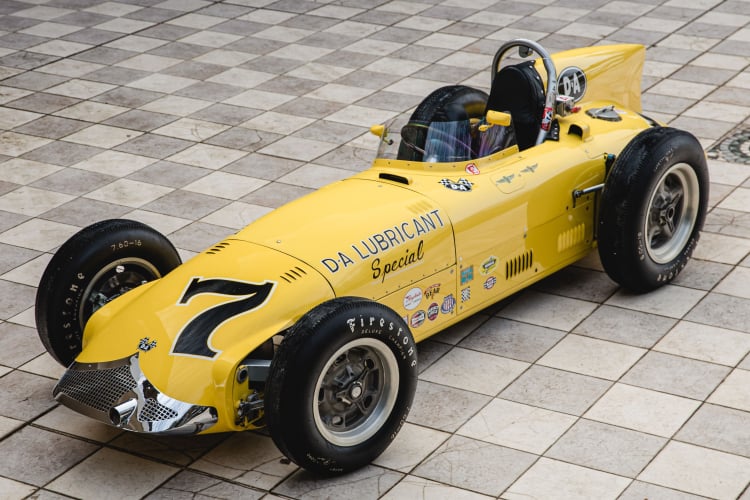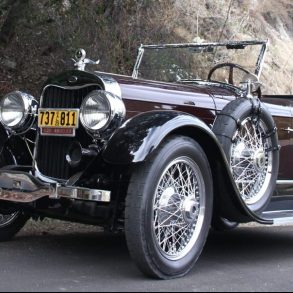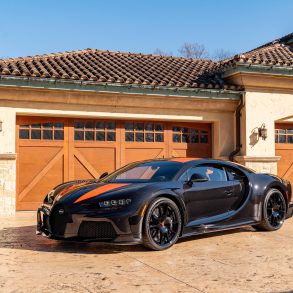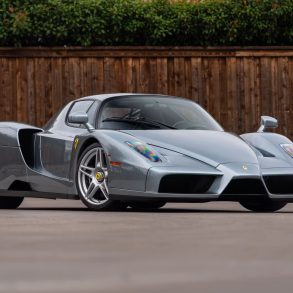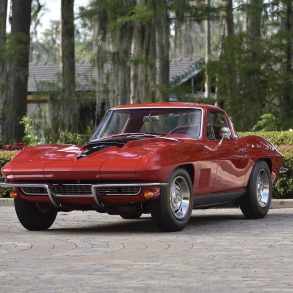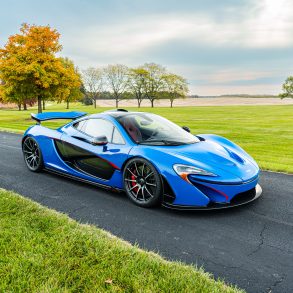The Mecum Indy 2021 Auction is to be held on May 14 -22 at the Indiana State Fairgrounds, with the line-up of vehicles heading to the auction block nothing short of spectacular, to say the least.
Here’s a preview of some of the stand-out vehicles featured at the Mecum Indy 2021 Auction:
- 1958 Kurtis Kraft 500H Offenhauser Indy Car – Lot R405
- 1964 Cooper Monaco Type 61 Sport Racer – Lot R407
- 2019 Ford GT Lightweight – Lot R412
- 1936 Duesenberg Model J Rollston Convertible Berline – Lot 409
- 2014 McLaren P1- Lot R546
- 1930 Duesenberg Model SJ Rollston Convertible Victoria – Lot R408
- 1934 Packard 1108 Twelve Dietrich Individual Custom Convertible Sedan- Lot R411
- 2020 Ford GT MkII – Lot R435
- 1957 Ford Thunderbird F-Code – Lot R302
- 1965 Shelby GT350R Fastback – Lot R208
1958 Kurtis Kraft 500H Offenhauser Indy Car – Lot R405
The 1958 Kurtis Kraft 500H Offenhauser Indy Car up for auction was purpose-built by the legendary race car builder Frank Kurtis and is superbly finished in a bright yellow D-A Lubricant No. 7 livery.

The example was raced in three consecutive Indianapolis 500 races, driven by Duane Carter, Johnny Thomson, and Don Freeland.
The highlight of the vehicle’s career was in the 1959 Indianapolis 500, where Carter finished 7th with Smokey Yunick as the car’s crew chief.

The Kurtis Kraft is powered by the Offenhauser 252 CI inline 4-cylinder racing engine mounted in laydown style and mated to a 4-speed manual transmission with a reverse gear.

In regards to safety factors, the Kurtis Kraft is equipped with a removable subframe that is bolted to the original frame to hold five-point racing seat belts as well as a removable roll bar mounted to the subframe.
The look of the cockpit is typical of race cars at the time, with a spartan look, equipped only with a few gauges and controls that can easily be seen or controlled from the black seat.

The Kurtis Kraft is fitted with Firestone “display” racing tires and modern reproduction mill-spec magnesium Indy wheels cast by Ron Blondel back in 2006.


1964 Cooper Monaco Type 61 Sport Racer – Lot R407
In 1958, British racing superstar Sir Stirling Moss staggered the Grand Prix world after he came out victorious at the season-opening Argentinian Grand Prix, driving only a tiny 2.0L midengined Cooper.

The win would be the first time a mid-engined Grand Prix vehicle claimed a World Championship victory and the first victory for builder John Cooper.
In the following race at Monaco, with Maurice Trintignant at the wheel, the vehicle was able to claim victory again declaring that it was not a one-time wonder.

Jack Brabham, Cooper’s No. 1 driver, left no doubt that the future of Grand Prix racing would center around mid-engined layout after claiming consecutive World Driver’s Championships and Constructor’s Cups in 1959 and 1960.
By then, Cooper has been able to learn and consequently improve on the competitive midengine layout that he used on the spaceframe Monaco Type 49 Mkl sports racer that was first introduced in 1958.

It featured a flexible but reliable design that met the FIA’s requirements for two-seat sports racers and quickly established itself as the dominant car in sports prototype competition. It provided the pathway for the USRRC and Can Am racers that would follow.
The significantly refined Mark III Type 61 was introduced in 1961, featuring a stronger and reconfigured chassis that was designed to hold out against the higher torque capabilities of American V-8 engines.

For improved cooling, a widened radiator intake was implemented. Under the reshaped aluminum skin, the MkIII used upper and lower wishbones and coil springs to improve rear suspension.
The example, one of only six Type 61 Sport Racers constructed in 1964, is also one of only two fitted with a fuel-injected Chevrolet engine. It campaigned successfully in SCCA and USRRC Competition with the sale coming complete with period photos, magazine articles, race reports, and a paper trail that leads back to Brewer and the Cooper Works in Surbiton near London.

In 2006, a complete nut-and-bolt restoration was performed on the CM 3-64, bringing it to its present configuration and livery.
In 2018, the Cooper Monaco Type 61 Sport Racer was also given a comprehensive mechanical overhaul and race preparation in which approximately $100,000 was invested into the example.

2019 Ford GT Lightweight – Lot R412
Chassis no. 116 is one of only 250 Ford GTs that were produced in 2019.

What makes chassis # 116 even more special is that it was delivered with the extremely rare 600A Lightweight Package option, offered only to select clients.
The Lightweight Package is a $70,000 option that includes weight-saving features that can be seen on the Carbon Edition.

Under the hood of chassis #116 is a twin-turbocharged and intercooled 3.5-liter, 647 HP DOHC 24-valve EcoBoost engine matched with a 7-speed dual-clutch automatic transmission with paddle shifters and Akrapovic titanium exhaust.

The example has a top speed of 216 MPH, and it can go from 0 to 60 in just 3.0 seconds.
It is completed in a Liquid Blue tri-coat with carbon fiber stripes finish and features the gloss carbon fiber exterior package. It has had only one owner from new and shows a mileage of only 18 miles.

1936 Duesenberg Model J Rollston Convertible Berline – Lot 409
This Model J Rollston Special Convertible Berline, with chassis # 2611 and engine # J-586, was the last completed Duesenberg to be rolled out of the factory showroom and the final Rollston body created.
This vehicle was transported to be displayed at the 1936 New York Auto Show. With a price tag of $17,000, it took the prize for the most expensive car featured.

The J-586, similar to every Duesenberg Model J, is constructed with a heavy ladder frame design, and this example incorporates a long 153.5-inch wheelbase.
A parallel semi-elliptic leaf springs, live rear axle, and solid front axle all support the chassis. Despite featuring the standard steel-spoke wheels, it is enhanced by black, full-width disc wheel covers with the addition of black sidewall tires.

The example is equipped with a 420/265 HP inline 8-cylinder Duesenberg engine with a 3-speed manual transmission.
One of the most modern and well-executed designs on a Duesenberg Model J is the gloss black Rollston coachwork. It features pontoon-style front and rear fenders, with the rear wheels having full skirts covering it.

The engine hood is unique in that it extends all the way towards the windshield frame. Like the ones seen on the 1934-37 Fleetwood Cadillac V-16’s, it was designed with triple long horizontal louvers and bright trim.
The sloping rear deck perfectly blends into the black fabric folding roof lines, improving the aerodynamic style of the vehicle.


The standard chrome-plated bumpers were applied on the front and rear bumpers, although the gloss black, bullet-style headlamps, and tail lamps provide a European theme.
The rear-hinged wide front doors share their huge chrome-plated hinges with the front-hinged rear doors.

The interior possesses a tan leather trim and a glass partition that disappears into the back of the front seat.

2014 McLaren P1- Lot R546
Having only traveled a total of 372 miles, this McLaren P1, chassis number 325 of a total of 375 produced, displays the McLaren Special Operations Bespoke interior and exterior.


The engine consists of a hybrid twin-turbocharged DOHC 3.8L/903 HP engine that is matched with a dual-clutch automatic transmission.
Features of the car include carbon ceramic disc-brakes, double wishbone independent suspension and a one-piece carbon fiber monocage.


The exterior is completed in semi-gloss carbon fiber with the interior colors being Brodger Fire Brown with Highland Hare Brown.
1930 Duesenberg Model SJ Rollston Convertible Victoria – Lot R408
This Duesenberg SJ Rollston Quarter-Window Convertible Victoria has the short wheelbase of 143.5 inches.
Paul Whiteman ordered the Duesenberg, being chassis # 2293 and engine # J-272 new, where it originally displayed a LeBaron Barrelside Phaeton body.
In 1932, it was purchased by its second owner, G. Tucker Smith from the Duesenberg Factory Branch.


In 1935, he had the body replaced with its current Rudy Creteur-designed Rollston body (body # 516-4435.)
Under the hood of the example is a dual-overhead-cam, supercharged 420 CI straight-8 engine. The vertical supercharger with outside exhaust pipes provided an output of 320HP, significantly more than the typically aspirated Model J version, which provided 265HP.


Wire Wheel Corporation from Buffalo, New York, manufactured the six chrome-plated 19-inch steel-spoke wheels, which have a boosted 4-wheel hydraulic drum brakes for stopping.
The Rollston body has a Maroon finish matched with a Maroon leather interior and folding top.

The engine-turned instrument panel has a variety of gauges which includes an altimeter, chronometer, and tachometer.
The Duesenberg has had a concours-level restoration in the past, and recently, it was given a detailing and mechanical inspection to ensure that it is ready to drive and show.


1934 Packard 1108 Twelve Dietrich Individual Custom Convertible Sedan -Lot R411
The year 1934 might have been caught up in the middle of the Great Depression, but Packard kept its distinguished reputation as one of the “Three P’s” of the 1910s and 1920s.

From 1916-1923, one of the significant offerings by Packard was the fabulous Packard Twin-Six. In 1923, the original Twin-Six Packard was discontinued only for Packard to introduce a completely new 445.5 CI L-head version in January 1932.
By 1934, Packard dropped the Twin-Six name and introduced a new model called the Packard Twelve.

The 1934 Packard Twelve 1108 up for auction (chassis # 902670) is based on a 146.87-inch wheelbase chassis and is supported by parallel semi-elliptic leaf springs with a live rear axle and the solid front axle.
It has 7.50-17 wide whitewalls tires that are mounted on chrome-plated steel-spoke wheels with dual side-mounted spares and painted metal covers.

The braking system incorporates mechanical vacuum-assisted 4-wheel drum brakes. The 12-cylinder engine (no. 90175) power output is transferred to the back axle through a vacuum-assisted clutch and a 3-speed manual synchronized shift transmission.
The body of the example is a Style 4070 Individual Custom Convertible Sedan designed by Dietrich. In 1934, the example was the only open four-door body style that Dietrich offered, and it is estimated that only 12 of these body styles are known to exist.

The sheet metal is finished in Dark Auburn and confirmed to be original, featuring fenders that have never been removed and even retaining its original welting.
The interior and top have been replaced to exacting standards using the original pieces as patterns during a professional restoration completed by noted marque expert Steve Babinsky of Lebanon, New Jersey.

In 2010, it claimed Best in Class and the CCA Trophy win at the Pebble Beach Concours d’Elegance.
In 2011, it received the Amelia Award at the Amelia Island Concours d’Elegance, while in 2012, it received the CCCA Senior Award, Badge No. 2981S.

2020 Ford GT MkII – Lot R435
The 2020 Ford GT MkII is simply the most advanced and exclusive Ford Track Car ever made. Over the course of three years, only 45 units will be produced in total.
Engineered free of race series rules, regulations, and limitations, this example was hand-built by Ford Performance and Multimatic to release the full Ford GT performance potential in a track-only version.


Under the hood of the 2020 Ford GT MkII is a twin-turbocharged 3.5-liter, 700 HP Eco Boost engine that is not fettered to race sanctioning bodies.
Features include a MoTeC data acquisition unit with rear display camera, 15.5-inch front, and 14.1-inch rear Brembo 4-wheel carbon-ceramic brakes, as well as a 5-way adjustable race-derived Multimatic DDSV dampers with a high-speed blow-off. The exterior features one-off livery of Ken Miles’ LeMans car.


The example incorporates race-ready aerodynamics, including an enlarged EVO front splitter, carbon fiber front fender louvers, dual-element rear wing, underfloor, and dive planes. The example has an impressive 400 percent more downforce compared to the Ford GT.
It is also equipped with a high-capacity air-to-air outboard mounted charge air cooler with water spray technology. A roof-mounted air intake feeds the clutch, transmission coolers, and auxiliary engine. It also has a Sparco driver and optional passenger seats with 6-point harnesses.

Unlike the other GT MkII, this track-only example is not covered by the two-year re-sale restriction period that was imposed on the street model.
The example has 15 miles on the odometer, and has never been raced.

1957 Ford Thunderbird F-Code – Lot R302
This 1957 Ford Thunderbird F-Code Convertible has a rich history, including previously owned by Jack Roush and a recently completed concourse restoration performed by world-renowned experts Amos and Justin Minter.

This example is one of only 196 created prior to the 1957 AMA racing ban. Of these produced, only 53 F-Birds was given a factory Raven Black finish of which the example is one, and isit was perfectly matched with a pleated Flame Red vinyl interior.
As Thunderbird enthusiasts will know, when it comes to the gold standard Thunderbird restorations, the Minter name has been a stand-out for decades and cemented their reputation through the years when it comes to the gold standard Thunderbird restorations. The exquisite example is the embodiment of that standard with impeccable craftsmanship and a gorgeous finish.

Under the hood is a 312/320 HP V-8 engine with the correct ECZ-code version, a 1957 Paxton VR57 supercharger with a single-pulley system, EDB-D low-compression heads, a Holley EDB 9510 AA 4-barrel carburetor, FEJ 12127-D dual-point distributor, F-series Thunderbird automatic harmonic balance, and AC fuel pump and filter.

As is typical in a Minter restoration, the engine compartment is completely factory-correct, from the factory-spec Sure Tite size 56 blower hose clamps to the individual plating finishes.
Minter has given the example the attention to detail that it deserves with the authenticity extending to even the correct 1957 GE/Ford Motor Company all-weather headlights and the NOS Ford Burtex trunk mat.

Despite the racing-inspired and supercharged F-Bird being the strongest performer of their lineup, the example can easily match its performance with the elegance and comfort of a Ford personal luxury car.
The example is fitted with options that include Master Guide power steering and a floor-shifted Ford-O-Matic 3-speed automatic transmission, tinted glass and accessory fender skirts, Town and Country pushbutton radio, all finished in Raven Black on red.
It also has a color-matching porthole hardtop, and Firestone Deluxe Champion wide whitewall tires adorned on glittering chromed wire wheels.

Amos and Justin Minter recently completed the restoration of this Thunderbird in 2021, and since completion, it has been driven only 57 test miles.
1965 Shelby GT350R Fastback – Lot R208
On November 10, 1965, the Shelby GT350R Fastback was finished at the newly established LAX facility of Shelby.
The example on offer was immediately consigned to the famous Ford and Shelby dealer in Tasca Ford, East Providence, Rhode Island upon completion. One week later, on November 17, the example was designated to the Cobra Caravan where it started its nationwide tour.
After the Caravan finished its tour, the example, 5R213, was brought back to Tasca Ford where it was displayed throughout the Christmas holidays.

By then, they had fully satisfied the public’s demand for a full-race GT350R and the example went through three Northeast Ford dealers before ultimately being shipped to Peru.
In Peru it was one of the five cars that were purchased by a group of sportsmen who were looking to compete against each other in Alpine rallies and endurance races.


In its years competing in rallies and endurance races, 5R213 was surprisingly almost undamaged.
When collectors Richard Cohen and Gary Nufer from Little Rock, Arkansas acquired the example in 1984, it was largely intact.


They then brought the example back to the United States where it had two subsequent owners before it was acquired by Jay Bentley from Woodstock, Connecticut in 1998.
He acquired the expertise of Cobra Automotive to restore the example for vintage racing.
Collectors Corey Lawson and Bruce Serene were then commissioned to give the example a Concours restoration and ensured that only original and NOS parts were used to return it to factory-original form.

For more information on the Mecum Indy 2021 Auction, please visit Mecum.
[Source: Mecum / Photos courtesy of Mecum Auctions]


